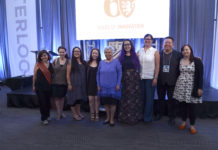Hydrated World, established in 2013 by UW alumni Aleks Poldma and Spencer Kelly, is an apparel company that is striving to end the global water crisis, and it is starting by supporting projects in East Africa.</p>
“Lack of safe water is one of the most urgent social issues,” Poldma said. “[It] leads to increased water-related illness, increased financial burden and decreased productivity.”
Hydrated World works by selling clothing to purchase biosand water filters for people who are unable to afford them. They work with manufactures in Toronto and Waterloo, and sell their apparel online. Approximately three dollars from every item sold contributes directly to their water projects. The company uses this money to purchase water filters from The Safe Water Project, a group of businesses centred in East Africa and also produce the filters locally. These filters are composed of numerous layers of gravel and sand, where non-harmful bacteria can grow and prosper, and thus outcompete harmful bacteria, such as E. coli and Vibrio cholera.
Hydrated World has helped with the provision of 80 biosand filter installations, which provide safe drinking water for approximately 800 people. “The filters are now providing over 1.5 million [litres] of safe water per year. People have reliable access to safe water and can begin to escape poverty,” Poldma stated.
To ensure the success of the placement and use of their biosand filters, Kelly, along with Bruce Taylor, president of Enviro-Stewards and founder of the Safe Water Project, spent three weeks in South Sudan, providing business and technical training in Feb. 2016.
According to Kelly, he and Taylor were able to provide assistance in establishing a new model of pricing the filters. When they first arrived in Yei, South Sudan, they found that biosand filters were being sold for the same price of 350 South Sudanese Pounds (SSP) as they had been a year before. “With the old selling price of 350 SSP, the team was losing money with every filter installed; a new model for pricing the filters needed to be established. Due to the rapidly fluctuating value of the SSP, a floating price point for each filter was established, equal to three times the cost of a bag of cement at the start of each month, more closely reflecting the true cost of a filter.” Kelly explained. “If a [Safe Water Project] team member were to sell a filter and never be fully compensated, as promised, it’s unlikely they will return to sell another filter.”
Kelly and Bruce also gave lessons to Safe Water Project team members on waterborne diseases, the positive effects of biosand filters, and business and technical training—called community health agent (CHA) training. Additionally, they helped to facilitate monthly meetings between the project technicians and the CHAs to “discuss learning points, challenges, and celebrate successes,” Kelly explained, “[As well as]… provide the opportunity to pay project technician wages and CHA commissions.”
While Poldma said that is difficult for people in Canada to help in combatting the water crisis in their everyday lives, he believes that awareness of the issue is the first step. “Being conscious of the rest of the world and having those discussions with friends and family increases our awareness. Getting involved with organizations that are doing great development work would be another good step.”






























